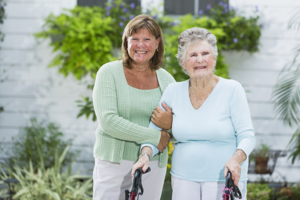What Every Orange County Family Caregiver Should Know

Learn the skills you need as a family caregiver to provide better care for your senior loved one.
If you’re providing care for a senior loved one, it’s probable that you fell into the responsibility without any formal training: you saw the requirement, and gallantly stepped forward to fulfill it. Yet, at CareWorks Health Services, substantial training is provided to each of our professional in-home caregivers before they are fully equipped to safely and effectively care for seniors. Through our efforts to empower family caregivers, we have outlined several of the crucial skills necessary to provide the best possible quality Orange County senior care.
Nutrition:
Ensuring necessary nutrition for the elderly can be complicated. Medication side effects can cause food to be less enjoyable. Chewing and swallowing issues can be a concern. And loneliness or depression can have a major effect on appetite. The fact is, senior malnourishment is now increasingly more common in older adults, and is not as simple as observing if a senior has lost weight. Speak to the senior’s physician or a dietitian to set up a nutrition plan; and, make sure the senior’s fluid consumption (particularly plain water) is ample—a minimum of 8 to 10 cups of fluid per day.
Infection Control:
Being in close contact with a senior loved one through providing personal care boosts the risk for spreading viral and bacterial infections. The most effective defense against infection is always keeping hands clean. Even if using protective gloves, hands should still be washed thoroughly with soap and hot water, both before applying and after removing gloves.
Communicating:
Communicating with your older loved one may seem second nature, but there are key points to consider in order to help the person feel more relaxed and to avoid damaging the person’s self-esteem. Older adults must be spoken to in a respectful manner—never being patronizing or demeaning. Asking open-ended questions, and allowing the senior adequate time to answer completely without interrupting, are important communication tips. And if the person is affected with dementia or Alzheimer’s disease, keep from correcting the person, particularly if the topic being discussed raises emotional responses such as anxiety or aggression.
Documenting:
Maintaining good records of every change noted in the older adult’s condition, and offering information to the healthcare team immediately, is key to making sure your loved one has all the details necessary to handle any potential issues. Note dates, times, and as many details as possible—physical changes, for example, increased pain, numbness, swelling, etc., in addition to any alterations in behavior and disposition.
Want more advice from our fully trained and highly skilled Orange County dementia care and senior care team, or a partner in care to supply hands-on assistance for your senior family member? We’re available to partner with family caregivers to make certain seniors receive the highest possible quality of care all of the time. Contact CareWorks Health Services at (949) 859-4700 to learn more.
